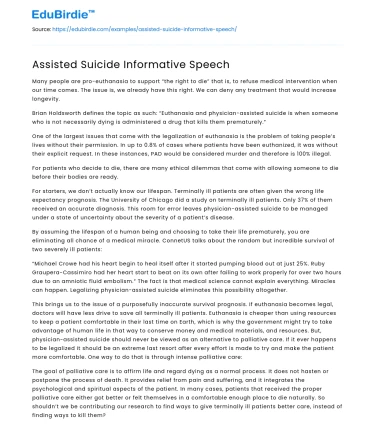Many people are pro-euthanasia to support “the right to die” that is, to refuse medical intervention when our time comes. The issue is, we already have this right. We can deny any treatment that would increase longevity.
Brian Holdsworth defines the topic as such: “Euthanasia and physician-assisted suicide is when someone who is not necessarily dying is administered a drug that kills them prematurely.”
Save your time!
We can take care of your essay
- Proper editing and formatting
- Free revision, title page, and bibliography
- Flexible prices and money-back guarantee
One of the largest issues that come with the legalization of euthanasia is the problem of taking people’s lives without their permission. In up to 0.8% of cases where patients have been euthanized, it was without their explicit request. In these instances, PAD would be considered murder and therefore is 100% illegal.
For patients who decide to die, there are many ethical dilemmas that come with allowing someone to die before their bodies are ready.
For starters, we don’t actually know our lifespan. Terminally ill patients are often given the wrong life expectancy prognosis. The University of Chicago did a study on terminally ill patients. Only 37% of them received an accurate diagnosis. This room for error leaves physician-assisted suicide to be managed under a state of uncertainty about the severity of a patient’s disease.
By assuming the lifespan of a human being and choosing to take their life prematurely, you are eliminating all chance of a medical miracle. ConnetUS talks about the random but incredible survival of two severely ill patients:
“Michael Crowe had his heart begin to heal itself after it started pumping blood out at just 25%. Ruby Graupera-Cassimiro had her heart start to beat on its own after failing to work properly for over two hours due to an amniotic fluid embolism.” The fact is that medical science cannot explain everything. Miracles can happen. Legalizing physician-assisted suicide eliminates this possibility altogether.
This brings us to the issue of a purposefully inaccurate survival prognosis. If euthanasia becomes legal, doctors will have less drive to save all terminally ill patients. Euthanasia is cheaper than using resources to keep a patient comfortable in their last time on Earth, which is why the government might try to take advantage of human life in that way to conserve money and medical materials, and resources. But, physician-assisted suicide should never be viewed as an alternative to palliative care. If it ever happens to be legalized it should be an extreme last resort after every effort is made to try and make the patient more comfortable. One way to do that is through intense palliative care:
The goal of palliative care is to affirm life and regard dying as a normal process. It does not hasten or postpone the process of death. It provides relief from pain and suffering, and it integrates the psychological and spiritual aspects of the patient. In many cases, patients that received the proper palliative care either got better or felt themselves in a comfortable enough place to die naturally. So shouldn’t we be contributing our research to find ways to give terminally ill patients better care, instead of finding ways to kill them?
Now that you understand there are always better options for terminally ill patients, what about the people who decide to go through with physician-assisted suicide who are not sick at all?
Richard Doerflinger, Public Policy Fellow at the University of Notre Dame said it best in my opinion: 'Campaigning to end certain people's lives doesn't end suffering – it passes on the suffering to other similar people, who now have to fear they are the next people in line to be seen as having worthless lives. Moreover, societies that authorize suicide as a 'choice' for some people soon end up placing pressure on them to 'do the right thing' and kill themselves. In states that have legalized assisted suicide, in fact, most patients request the lethal drugs not due to pain (or even fear of future pain), but due to concerns like 'loss of dignity and 'becoming a burden on others'”
So, euthanasia is becoming a way for people to run away from their problems. We should be investing our energy in making sure that these people feel loved and cared about. This is the only way to prevent the infliction of premature death. Because at the end of the day, legal or not, people are going to take their own lives. Instead of legalizing euthanasia, let’s focus our energy on better palliative care for terminally ill patients and better outreach to suicidal ones. Let’s try to save people’s lives instead of finding ways to end them. It is our duty as humans to help each other through the life we have been given, not to help each other end it.






 Stuck on your essay?
Stuck on your essay?

